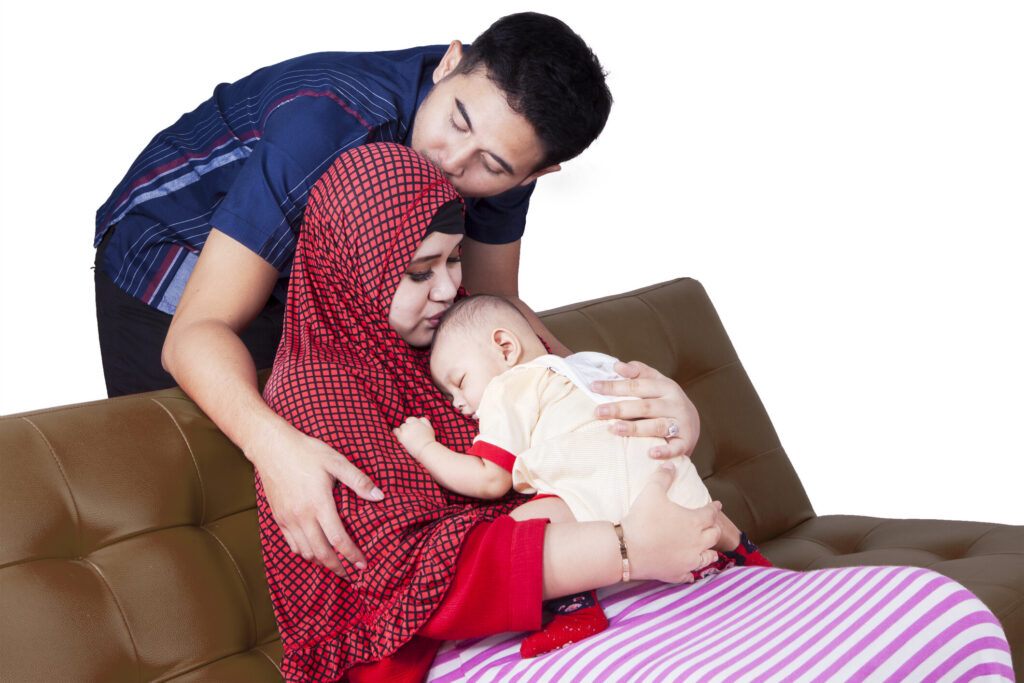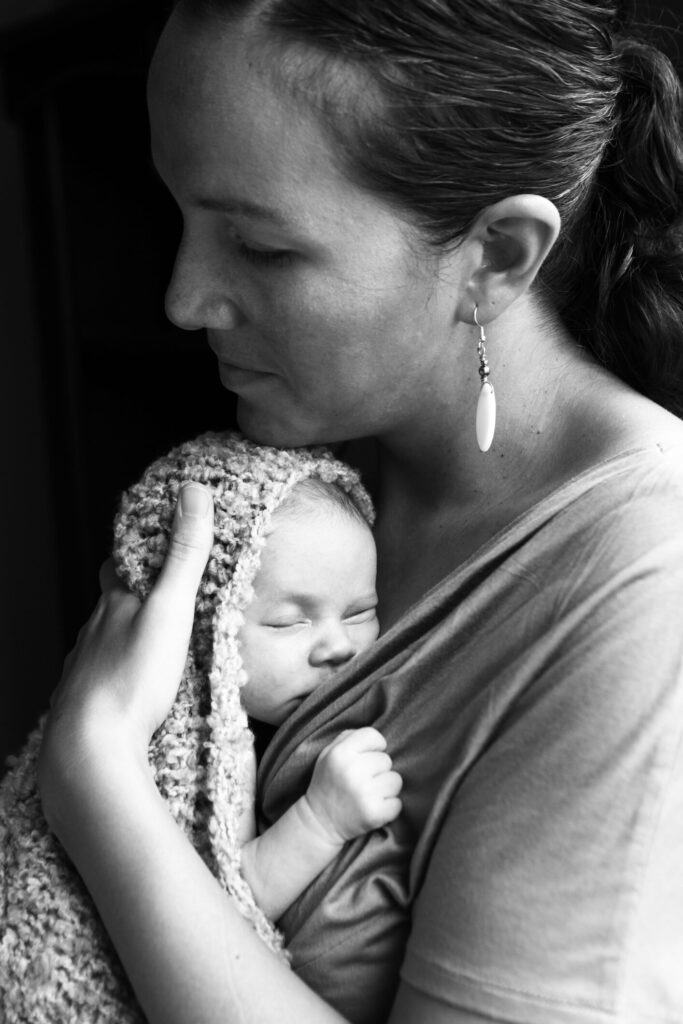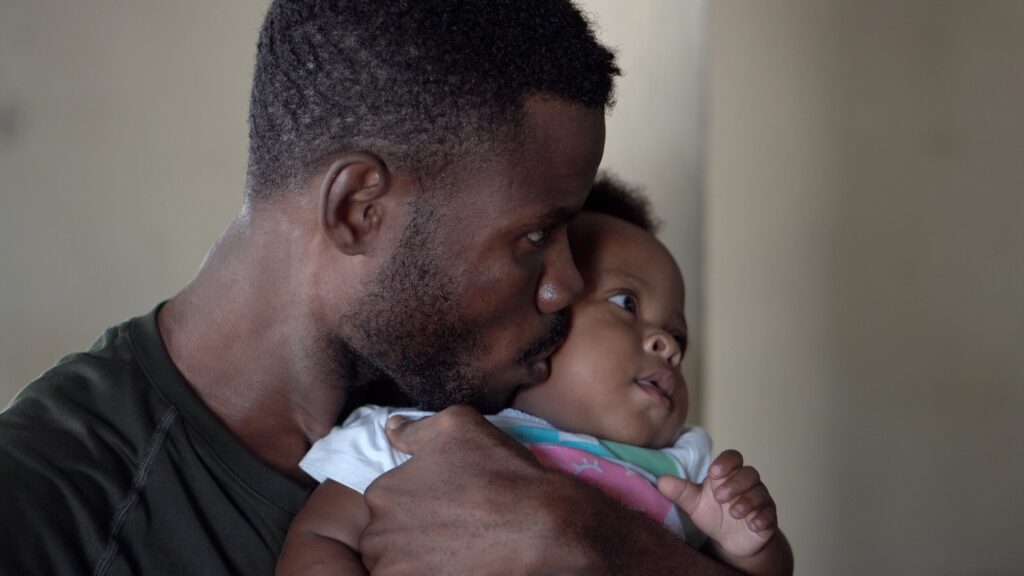
Postpartum Support International is an organization that has wonderful resources and support for new parents. Access free, local or virtual 24/7, anonymous support and information here.
Women and birthing people experience many physical, hormonal, sleep, and relational changes while pregnant and after giving birth. With so much going on it is VERY common for women to have many different feelings in the weeks and months after having a baby. Most new mothers experience feeling down, cry easily, and/or feel very worried during this time. For some, these feelings last only a few weeks and may be difficult but manageable. For some, these feelings are very intense and overwhelming. They may feel out of control and upset that what is supposed to be the “happiest time of their lives” is actually sad, scary, and full of worry. We hope to break the stigma. Being able to speak up and be vulnerable takes SO much strength. It’s on us to be open so moms don’t feel they should hide how they are feeling – or have them feel any shame for what they’re experiencing.
1 in 5 moms suffer from postpartum depression. An estimated 60% of mothers with depressive symptoms go untreated. The percentages are higher for women who are also dealing with poverty. Depression is the most common complication of childbirth. You are not alone.
Don’t wait until your postpartum appointment if you need help. Call your healthcare provider now. The sooner you get support, the sooner you’ll begin to feel better. There are some mental health conditions that are urgent maternal health warning signs and need to be addressed with a healthcare provider right away. Learn 1, when to call 911, 2, when to call PSI or the 988 maternal health hotline, and 3, when to call a provider here.
From Postpartum Support International: Symptoms can start anytime during pregnancy or the first year postpartum. They differ for everyone, and might include the following:
- Feelings of anger or irritability
- Lack of interest in the baby
- Being overly worried about the baby
- Not being able to eat or sleep well
- Crying and sadness
- Feelings of guilt, shame or hopelessness
- Loss of interest, joy or pleasure in things you used to enjoy
- Having headaches, chest pain, numbness, hyperventilating (fast and shallow breathing) and heart palpitations (the heart beating fast and feeling like it is skipping beats)
- Possible thoughts of harming the baby or yourself
Postpartum Mental Health, Mood, and Anxiety Terms to Know:
Baby blues is used to describe the worry, sadness, anxiety, and big emotions that almost all new moms experience in the first weeks after having a baby. With time, the feelings of sadness, frustration, anger, anxiety, etc. will begin to subside as hormones balance and postpartum healing has begun to happen. Postpartum depression and baby blues share many similar symptoms, like mood swings, sadness, insomnia, and irritability, but if it doesn’t ease up, it is time to find support.
Postpartum depression (PPD) is the most common of the postpartum mood and anxiety challenges (there are six types). PPD is often caused by major hormone and lifestyle changes after childbirth – add lack of regular sleep, irregular meals, health issues, etc., and PPD can be made even worse. PPD is 100% treatable but it won’t go away on its own, so recognizing symptoms and getting help will generally help manage. Click here to learn about PPD symptoms, treatment, and support.
Postpartum anxiety (PPA) is also common. This can also go undiagnosed or mislabeled as postpartum depression. If you feel anxious, have prolonged nervous energy, feel out of control / overwhelmed, or have constant feelings of worry, talk to a health provider. Click here to learn more about postpartum anxiety, symptoms, treatments, and finding support. Approximately 6% of pregnant women and 10% of postpartum women develop anxiety.
Post-traumatic stress disorder (PTSD) typically happens after a traumatic or frightening childbirth experience, such as an emergency C-section, severe complications, or a scary threat to mom’s or baby’s life. Unexpected and scary medical situations can be hard to process and can interfere with bonding with baby. About 9% of women experience postpartum post-traumatic stress disorder (PTSD) following childbirth.
Postpartum OCD or postpartum obsessive-compulsive disorder, is where new mothers experience a lot of overwhelming and troublesome thoughts or mental images about harming their baby or themselves. This can lead to compulsive behaviors, like excessive cleaning or checking on the infant. PP OCD affects about 3-5% of new mothers and can come out of nowhere after childbirth. Postpartum OCD is treatable through cognitive-behavioral therapy focused on exposure and response prevention, as well as medication in some cases.
Bipolar disorder can look like depression or anxiety – but is more severe. There is a very high risk of increased severity if you are treated only for depression, but have the potential to move into a manic or hypomanic part of your cycle (PSI).
Postpartum psychosis is considered a medical emergency requiring immediate treatment, as it increases the risk of self-harm, suicide, or infanticide due to the individual’s impaired sense of reality. Postpartum psychosis is a rare but severe mental illness that can occur in the days or weeks after childbirth. Symptoms include delusions, hallucinations, paranoia, mood swings, and disruptions in thinking and behavior that are not reality.
What about my PMAD medication during pregnancy and breastfeeding? Be sure you are in open communication with your health provider about your mood, feelings, and experiences. They will work with you on your specific treatment plan. Here are answers to your questions about PMAD medication during pregnancy and breastfeeding: PSI on Medication.
Things to do that might help
First, know that it gets better. There is ALWAYS hope, and things will change. YOU MATTER. Asking for help is a sign of strength. Motherhood can be hard, but if there was ever a time to give yourself grace – this is the time. It is okay to not like how things are right now. If you are feeling ‘dark,’ you are not alone. It is something people WANT so badly to walk with you through. Speaking up takes so much courage – it is worth it.
Know that there are free, anonymous text, chat, mobile app, and phone lines available to support you every single day!
- Know that these are ALL treatable. Find the strength to speak up. Tell someone you trust what you are feeling.
- Talk with your health provider openly and honestly. Don’t wait for an appointment if this feels particularly overwhelming.
- Therapies, such as support groups or professional therapy sessions can be great – many are free, anonymous and available 24/7.
- Explore Postpartum Support International for information, local resources, and an extensive network of support – click here for the HelpLine and lots of resources. If you feel like you are in a crisis call for help immediately (911, 988, other options here).Call the PSI HelpLine: 1-800-944-4773, #1 En Español or #2 English OR Text “Help” to 800-944-4773 (EN) / Text en Español: 971-203-7773.
- You can always call the national maternal mental health hotline: 1-833-TLC-MAMA or 988 is the suicide hotline.
- Medications are available that can make a big difference
- Talk to a mom group – You can find free local and online support groups – start here! You can also find resources for specific types of birth, locations, etc. Black mothers also have the IRTH App for Black mothers.
- Self-care techniques, such as deep breathing, walks, reading, and exercise when it is deemed safe by your provider can help. Sleep has many healing properties. It is so hard to get for new moms but so very important for mental and physical well-being. Mindfulness matters! Dr. Karen Sheffield-Abdullah has created a video series of mindfulness exercises to view and practice.
- Take a break – from the baby, your home, and whatever you need by stepping away for a few minutes or hours (be sure to leave your baby with someone who is safe first)
Risk Factors
Research shows that all of the things listed below put you at a higher risk for developing perinatal mood and anxiety conditions. If you have any of these factors, you should discuss them with your provider so that you can plan ahead for care. That way, support is lined up in advance and you can use it to the extent it is helpful.
- A personal or family history of depression, anxiety, or postpartum depression
- Premenstrual dysphoric disorder (PMDD or PMS)
- Inadequate support in caring for the baby
- Financial stress
- Relationship stress
- Complications in pregnancy, birth or breastfeeding
- A major recent life event: loss, house move, job loss
- Mothers of multiples
- Mothers whose infants are in Neonatal Intensive Care (NICU)
- Mothers who’ve gone through infertility treatments
- Women with a thyroid imbalance
- Women with any form of diabetes (type 1, type 2 or gestational)
Perinatal mood and anxiety disorders are temporary and treatable with professional help. If you feel you may be suffering, know that it is not your fault and we are with you.
Maternal Mental Health Disparities Exist: Black, Asian, Native American, and Latina mothers are 19-56% less likely to be screened for postpartum depression1. Things that are leading to these disparities include stigma, language, and cultural barriers, distrust of the healthcare system, lack of diversity among providers, and SDoH barriers like lack of childcare and time off work5. Addressing racial inequities in postpartum mental health requires a multi-pronged approach of increasing screening, providing culturally-responsive care, expanding access to treatment, and tackling systemic racism in healthcare.
Resources to Explore:
- Postpartum.net has a lot of really important information about the different types of mood issues for new moms and many great resources, including a toll free number to call.
- Talk with someone about how you are feeling and what might help. – see the “Building My Village” section of our site.
- Don’t wait for the 6-week check-up
- Office of Women’s Health on Postpartum mood, depression, and more
- Shades of Blue
- Maternal Mental Health Leadership Alliance Fact Sheets
- IRTH App for Black mothers
- Read our sections on Preparing for Postpartum Care and Health Communication
*In a medical emergency, in addition to calling 911, for mental health emergency support, be sure to call 988 (suicide hotline), and/or the maternal mental health hotline or PSI hotline – FREE, 24/7, anonymous in Eng/Spanish via text, chat, phone, and mobile app.








